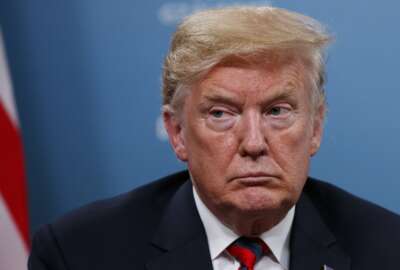Best listening experience is on Chrome, Firefox or Safari. Subscribe to Federal Drive’s daily audio interviews on Apple Podcasts or PodcastOne.
A coalition of 13 federal unions is suing the Trump administration over all three of the president’s recently signed executive orders on employee accountability, official time and collective bargaining.
The National Federation of Federal Employees (NFFE), along with the International Association of Machinists and Aerospace Workers, International Brotherhood of Teamsters, National Association of Government Employees, National Labor Relations Board Union, National Weather Service Employees Organization and seven other organizations, filed the lawsuit in the U.S. District Court for the District of Columbia.
The coalition will also seek injunction from the federal court to immediately block implementation of the three orders.
“It is clear to us that President [Donald] Trump is attempting to exceed his authority in issuing these executive orders targeting federal employees and their unions,” NFFE National President Randy Erwin told reporters Wednesday afternoon. “The president has a way of taking action first and figuring out if it was legal later. We believe his executive orders violate the law in many areas.”
Specifically, the union’s lawsuit charges Trump and OPM on six counts.
First, the unions argue the president doesn’t have broad authority to legislate beyond the provisions in the Civil Service Reform Act (CSRA), which Congress passed in 1978.
“Congress, in passing the Civil Service Reform Act and chapter 71 especially of that, carefully created a statutory scheme governing labor relations in the federal sector,” Jeff Friday, NFFE’s general counsel, said Wednesday afternoon. “These executive orders generally are an attempt to re-legislate that, and are therefore improper.
The unions’ five other counts describe more specific problems they see with the president’s EOs. For example, the coalition argues that the orders separately conflict with existing law on employees’ right to use official time, attempt to legislate a different performance improvement plan than what Congress originally intended and restrict the current scope of collective bargaining.
“Trump is exceeding his authority, as Congress granted unions and agencies the right to decide which matters are and are not subject to the negotiated grievance procedure through collective bargaining, not the president,” Erwin said.
The unions also said the official time order interferes with employees’ rights to petition Congress.
Finally, one of the executive orders prevents union representatives from using official time to prepare or pursue grievances brought to an agency, but it doesn’t restrict employees from using official time to prepare their own grievances.
“Treating the union and its representatives differently from individual employees encroaches on the union’s fundamental right to collective action,” Erwin said.
The coalition’s lawsuit differs from the two legal actions previously taken by the National Treasury Employees Union (NTEU) and American Federation of Government Employees (AFGE).
The National Treasury Employees Union (NTEU), which also recently filed an injunction to immediately block the executive orders’ implementation, also broadly argued that two of the president’s EOs conflict with the CSRA but offered different and more specific arguments.
In contrast, AFGE has argued the president’s EO on official time violates its members’ First Amendment rights to expressive association.
NFFE said it consciously decided to challenge all three executive orders. The previous two lawsuits challenge two of the EOs on official time and employee accountability, but NFFE acknowledged that many unions may join together.
“The custom of the court may happen that all these cases will be consolidated into one case,” said Mark Schneider, general counsel for the International Association of Machinists and Aerospace Workers. “All of the unions that have filed suits are committed to working together. The arguments we make in this suit are completely consistent with the arguments made in the other suits. I think what you’re going to see is all the unions representing federal employees really speaking with one voice on this issue.”
NFFE said it expects the administration will issue more executive orders directed at the federal workforce in the coming months.
Meanwhile, OPM is expected to issue more specific regulations and guidance on the implementation of these three orders in the coming weeks. Both NTEU and NFFE are seeking injunction before OPM releases more specific regulations, with the goal of fully blocking the orders’ provisional changes before noticeable impacts occur.
Though it didn’t have many details, NFFE said it’s started to notice the effects.
“We’re already hearing anecdotal stories of federal unions that are bargaining with agencies, where agencies have basically ripped up the contract,” Friday said. “Agencies have told unions that they’re going to rescind existing portions of the contract, even down to folks being told that the union is no longer being allowed to replace the cartridge on the printer they have in the union office.”
Copyright
© 2024 Federal News Network. All rights reserved. This website is not intended for users located within the European Economic Area.
